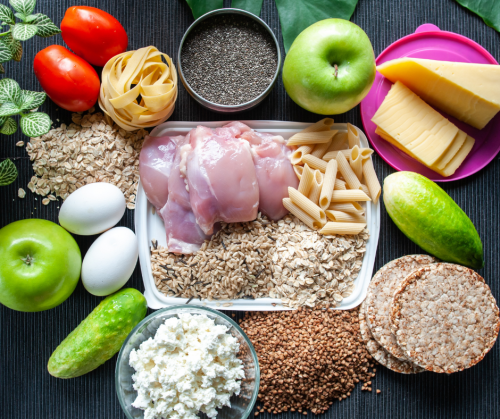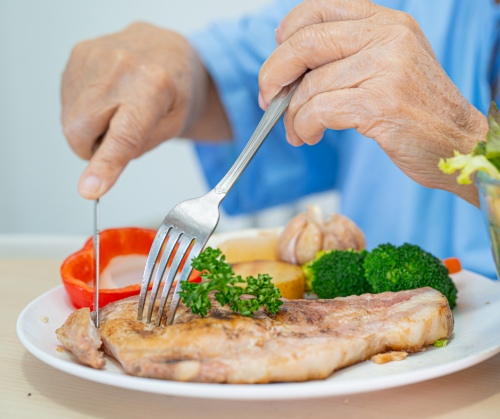Senior nutrition is vital for maintaining health, managing chronic conditions, and enhancing quality of life. As metabolism slows down and nutritional needs change with age, it’s essential to focus on nutrient-dense foods that support overall well-being. As people age, their bodies require fewer calories, but more nutrients.
 Key nutrients for seniors include:
Key nutrients for seniors include:
- Protein: muscle maintenance and repair. It also is essential for maintaining muscle mass and strength, and helping prevent sarcopenia (age-related muscle loss), which can lead to decreased mobility.
- Fiber: preventing constipation and other digestive issues.
- Calcium and Vitamin D: maintains bone density and prevents osteoporosis and fractures.
- B Vitamins (B6, B12, Folate): energy, metabolism and brain health.
- Omega-3: heart health, joint health, helps reduce inflammation, and helps reduce cognitive decline.
Common Nutritional Challenges Seniors may Face:
- Appetite Changes: decreased appetite can lead to inadequate food intake as well as a metabolic slowdown which causes them to eat less. They also face sensory changes where food may not taste as strong as it did before.
- Dental Issues: problems with teeth or dentures can make eating difficult.
- Digestive Problems: aging can affect the digestive system, leading to issues like constipation or diarrhea, reduced nutrient absorption and slower digestion. There also may be increased dairy product sensitivity which can limit intake of calcium and vitamin-d rich foods.
- Chronic Conditions: diseases like heart disease, diabetes or cognitive issues may require specific dietary adjustments or accommodations.
- Medication Side Effects: some medications can affect appetite, taste or nutrient absorption.
How We Can Help:
 Our communities value and take pride in providing customized, nutritious and unique meals for our residents three times a day. Our talented dietary team are always updating and accommodating menus to meet the requirements and preferences of our residents. We even make it fun by including their recipes they grew up making in our meal plans or using vegetables from our gardens in our meals. We provide nutrient-dense menus with meals that include a balance of protein, carbs, fats, and essential vitamins/minerals. We regularly rotate menus to provide a variety of meals. We take pride in hosting a comfortable environment with dining areas designed to be comfortable and inviting. Our team of quality caregivers also can assist with eating for those individuals who need assistance with eating, cutting up food or drinking. Our team frequently does nutritional assessments to monitor residents’ nutritional status and adjust meal plans per their doctors’ orders. Our team also regularly tracks residents’ weight to identify any concerning trends. Hydration is very important for our seniors, so we monitor our resident’s hydration by ensuring they have adequate fluid intake. We have snacks available 24/7 in our cafes for residents and guests to enjoy. Socialization and sense of community is so important as we age, so we encourage communal dining to promote social interaction and reduce feelings of isolation. Our team coordinates medication schedules to minimize interactions between medications and food. Lastly, we closely monitor and manage dysphagia with specialized meal preparation techniques, such as pureeing or thickening foods for residents with swallowing difficulties. Below are some recommendations that we utilize and suggest living an overall healthy, nutritional lifestyle.
Our communities value and take pride in providing customized, nutritious and unique meals for our residents three times a day. Our talented dietary team are always updating and accommodating menus to meet the requirements and preferences of our residents. We even make it fun by including their recipes they grew up making in our meal plans or using vegetables from our gardens in our meals. We provide nutrient-dense menus with meals that include a balance of protein, carbs, fats, and essential vitamins/minerals. We regularly rotate menus to provide a variety of meals. We take pride in hosting a comfortable environment with dining areas designed to be comfortable and inviting. Our team of quality caregivers also can assist with eating for those individuals who need assistance with eating, cutting up food or drinking. Our team frequently does nutritional assessments to monitor residents’ nutritional status and adjust meal plans per their doctors’ orders. Our team also regularly tracks residents’ weight to identify any concerning trends. Hydration is very important for our seniors, so we monitor our resident’s hydration by ensuring they have adequate fluid intake. We have snacks available 24/7 in our cafes for residents and guests to enjoy. Socialization and sense of community is so important as we age, so we encourage communal dining to promote social interaction and reduce feelings of isolation. Our team coordinates medication schedules to minimize interactions between medications and food. Lastly, we closely monitor and manage dysphagia with specialized meal preparation techniques, such as pureeing or thickening foods for residents with swallowing difficulties. Below are some recommendations that we utilize and suggest living an overall healthy, nutritional lifestyle.
 Fruits and Vegetables:
Fruits and Vegetables:
- Aim for a variety of colors to ensure a range of nutrients. Fresh, frozen, or canned options are acceptable, but choose low-sodium and no-sugar-added versions. Examples: leafy greens, berries, carrots, apples.
Protein:
- Include lean meats, poultry, fish, eggs, dairy, beans, and nuts. Aim for seafood at least twice a week for omega-3 fatty acids. Examples: chicken, salmon, eggs, greek yogurt.
Whole Grains:
- Provide essential fiber and B vitamins. Examples: oatmeal, whole wheat bread, brown rice, quinoa.
Dairy or Dairy Alternatives:
- Important for calcium and vitamin D. Aim for low-fat or fat-free options. Examples: milk, cheese, yogurt.
Healthy Fats:
- Focus on unsaturated fats while limiting saturated and trans fats. Examples: avocado, olive oil, nuts, seeds.
Fluids:
- Seniors are at risk of dehydration, so adequate fluid intake is crucial. Aim for at least 8 cups of water per day, depending on individual health needs.
 Specific Dietary Needs
Specific Dietary Needs
Our assisted living facilities work with professional, high-quality dietitians to create meal plans tailored to individual dietary needs, preferences, and medical conditions. We will also cater to special diets, such as vegetarian, gluten-free, or renal diets. For individuals with diabetes, we plan out balanced meals that are low in refined sugars and high in fiber. For individuals with heart disease, we emphasize heart-healthy fats, whole grains and reducing sodium intake. For individuals with osteoporosis, we ensure they are consuming adequate calcium and vitamin D for bone health and strength. For individuals with food allergies, we use alternatives to accommodate those allergies such as no milk for individuals with lactose intolerance. We also will adjust caloric needs based on the individuals care plan and doctors’ orders.
The topic of nutrition is dense and can be talked about in a variety of ways. Especially as we age, there are tips and plans that can help the longevity of life and overall wellbeing. Our Golden Horizons communities provide comprehensive support to ensure that seniors receive balanced, nutritious meals that cater to their individual needs. Through personalized meal planning, professional oversight, and a focus on enjoyable dining experiences, we help promote optimal nutrition, overall health, and a high quality of life for our residents.



